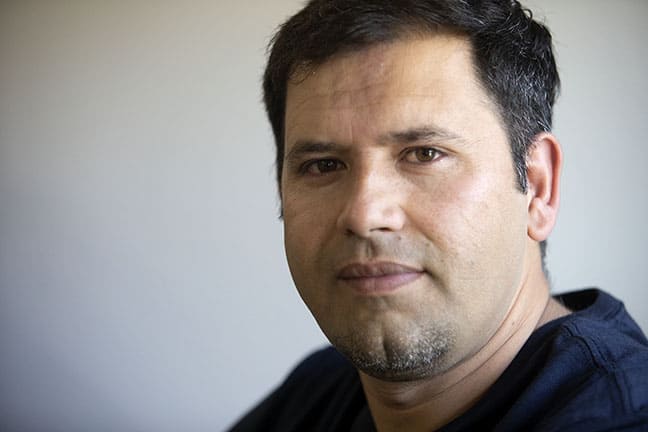Afghani family safe, but starting over

Afghan refugee and artist Abdul jalil Barati. COURIER photo/Steven Felschundneff
by Melina Tisopulos
Abdul jalil Barati and Zuhal Barati had only two small bags of essentials for their four-month-old son when they fled their home in Afghanistan. The decision to leave had been very sudden.
Just days earlier, on August 15, 2021, Abdul was working as a translator for the United States Embassy when the Taliban took control of the capitol. Since he was needed to translate for the security guards, he had to stay put until everyone else had left the embassy by helicopter.
Once he was allowed to return home, he was instructed to stay in lockdown until told otherwise. He was warned that his ties to the United States put him and his family at risk of Taliban reprisals
“Everything was changed,” Barati said. “The threat was high level. If they capture you, they will kill you. No question.”
After four tense and sleepless days, he received a message at nearly one in the morning instructing him and his family to go to an airport gate. There they were met with sheer chaos; frantic crowds of thousands swarmed the entrance to the airport, with worry arising in Barati for the safety of his very young son.
After showing his U.S. State Department badge to an American soldier, his family was guided inside. They then spent another restless night on the airport floor.
“I didn’t have any experience like that before,” Barati said. “It was a really bad situation…I could never forget that.”
The next day, the family was crammed onto the floor of a U.S. Army aircraft with hundreds of others, headed for Qatar. With Barati’s State Department status, they were then sent to Washington, D.C., and from there, to Fort Bliss, a military base camp in New Mexico. The overcrowded military barracks remained their home for the next three months as their documents were processed and the family received vaccinations.
Wanting to be close to his wife’s cousin in Fontana, they requested to move to California. Their case was taken by the International Institute of Los Angeles, which then introduced them to the Newcomer Access Center, a Claremont-based nonprofit that provides support and resources to refugee and immigrant families.
After arriving in December 2021, the NAC provided the family with housing in Claremont for four months and helped them get acclimated to the area. They also assisted Barati in applying for jobs.
Though both earned master’s degrees in Afghanistan — his wife in business and Barati in fine arts — the couple were starting from scratch in America.
Barati now works two jobs, at a gas station and a grocery store.
“I am working day and night,” he said. “Sometimes it makes me tired, but I am glad to have a job.”
Though he is relieved to have found work, he hopes to eventually transition to a job with a higher salary. Soon he hopes to begin taking courses for the gas station franchise with the goal of becoming a manager. His wife is also hoping to find a job soon, perhaps joining him at the gas station or in the graphic design field, where she has experience.
She is currently taking ESL courses, and Barati is planning to enroll in community college. For now though, his priority is to complete the special immigrant visa process.
They considered moving to other parts of California but found nowhere else has what Claremont offers. Now living in an apartment in Pomona, they remain connected to the city’s community. They look forward to raising their 15-month-old son here, optimistic of what it offers for his future. The support the local community has shown them as refugees has made them feel very welcome.
“I love the area,” Barati said. “I haven’t seen anyone disturb or disrespect us. When they learn we are refugees, they respect us a lot and help.”
The most challenging adjustment for him has been being separated from his family members in Afghanistan. It saddens him not to know when they will be together again.
“We always talk every night, but talking is different from when you see them. We miss them a lot,” he said. “It’s sad to think about them. It’s hard.”
Barati also worries for his Afghani family’s safety, as the Taliban-controlled government frequently questions them about his whereabouts. He would like them to move to the United States, but it is difficult to offer them support while he is still navigating his own visa process.
The couple both have backgrounds in art, so another goal is to mount an exhibition of their work. She is a graphic designer and has worked as an art lecturer. He studied art in Afghanistan and works with multiple mediums, including photography. His pieces were featured in a 2013 exhibition in Maryland, as well in Afghanistan. Though Barati had to leave his physical artwork behind, he has digital copies saved, along with about 2,000 photographs of Afghanistan.
Printing is costly, so the couple is hoping to receive support from local organizations or individuals to make sharing their work possible. Barati believes his pieces will offer enriching insight on life in Afghanistan, allowing the public to broaden their perspective on his home country.
“If you see it, you can feel the situation,” he said.
Melina Tisopulos is a rising senior at Claremont High School and is the COURIER’s summer intern.









0 Comments